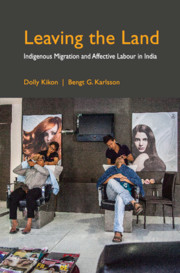5 - Dreams and Desserts
Published online by Cambridge University Press: 04 May 2019
Summary
Are you sleeping well? Are you eating well? I ask my son. I worry if he is doing okay in Mumbai.
– Narola, mother of a migrant during an interview in Dimapur, 2007This chapter describes how dreams and food capture the experiences of oscillating between the places migrants call home and away. We specifically focus on conversations about dreams and food to connect with the layered articulations of sensory experiences of mobility and consumption. Food, as Kikon notes in her work on consumption of fermented food in India, are deeply intertwined with experiences of citizenship. In our work on migration, we noticed how accounts of dreams and food were, ‘… connected with people's lives and small details or passing comments (were) necessarily not just ignored’ (Kikon 2015: 330).
We present accounts of dreams and food to highlight how leaving the land, a theme we highlight in this book, captures the experience of indigenous youth who are moving away from ancestral territories. By focusing on dreams (as nightmares to describe the anxieties and alienation of families and homes) and food (as items that produce new values and knowledge about community), we describe how indigenous migrants negotiate their way in the hospitality industry as servers fraught with standards and definition about world-class service, taste, and luxury. The reason we juxtapose dreams and food is to elaborate the different levels of signification about migration among indigenous communities in Northeast India. The effect of migration is deep and emotional. It is a movement that involves displacement and circulation, and embodies the essence of what Ghassan Hage refers to as the element of haunting that migration encounters. Haunted by the places and the homes, Hage notes that these are not merely nostalgia but the deep ways migrants experience another place (and life) simultaneously in their new destinations.
As indigenous migrants move away from their families and homelands, there is a sense of sadness among the parents and loved ones who stay behind. They recount how their worries come to haunt their dreams as well. Accounts of mobility and food have been captured well stretching across the Indian Ocean (Ho 2006), colonialism (Mintz 1985), migrant workers (Holmes 2013), immigrants’ experiences with taste (Ray 2015), and ethics (Desoucey 2016).
- Type
- Chapter
- Information
- Leaving the LandIndigenous Migration and Affective Labour in India, pp. 97 - 112Publisher: Cambridge University PressPrint publication year: 2019



